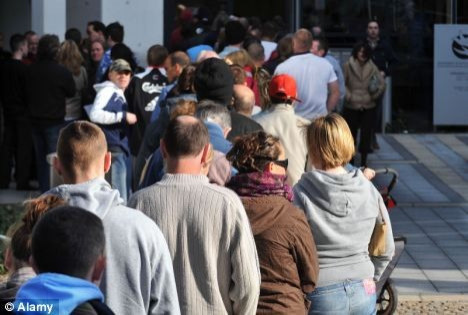British Jobless Rates Reaches 15-Year High

The number of jobless people in the United Kingdom rose to 2.62 million in the third quarter – translating to an 8.3 percent unemployment rate -- while youth joblessness soared to a new record high, according to the Office for National Statistics (ONS).
The overall jobless rate is the highest in fifteen years.
ONS also said that there are now 1.02 million jobless Britons between the ages of 16 and 24.
Moreover, the number of people claiming Jobseeker's Allowance (unemployment insurance) climbed by 5,300 to 1.6 million last month.
Interestingly, overall unemployment among females -- now at 1.09 million -- is at a 23-year high.
Also, perhaps as a surprise, the number of self-employed Britons rose to a record 4.09 million.
Not surprisingly, the region with the highest jobless rate, at 11.6 percent, was the economically ravaged Northeast.
These figures show just how much our economy is being affected by the crisis in the Eurozone, said Employment Minister Chris Grayling.
”Our European partners must take urgent action to stabilize the position.”
However, the opposition Labour Party blamed the high jobless figures on the government’s spending cut scheme.
The British economic recovery was choked off well before the instability in the last few months in the Eurozone, said shadow chancellor Ed Balls.
The government is cutting too far and too fast and it's pushing borrowing and unemployment up at the same time.”
Analysts were also glum about the jobless data.
“Overall, this is another nasty and worrying set of labor market data,” Howard Archer, chief UK and European economist at IHS Global Insight in London, commented.
“And particularly depressingly youth unemployment rose above one million. Meanwhile, wage growth remained muted in September, reinforcing the squeeze on consumers’ purchasing power but reinforcing belief that underlying inflationary pressures will remain muted.”
Adding to the gloom, Sir Mervyn King, the governor of the Bank of England (BoE) warned that the British economy may remain stagnant until the middle of next year. The central bank reduced its GDP growth forecasts for both 2011 and 2012 from 1.5 percent to about 1 percent, citing the worsening global economic outlook.
Archer added: “Persistent economic weakness, lower business confidence and mounting public sector job cuts are combining to take an increasing toll on jobs. Meanwhile, ongoing muted wage growth is maintaining the serious squeeze on consumers’ purchasing power.”
The extraordinarily high unemployment among British youth is of particular concern.
Today's figures are a wake-up call for Britain. It is critical to help young people into work for the future of our economy and society, said Martina Milburn from the Prince's Trust charity.
Archer also said he expects unemployment to continue to rise through to the middle of 2012 “at least as public sector jobs are pared and private sector companies limit their employment in the face of muted economic activity. We currently expect the economy to be stagnant over the fourth quarter of 2011 and the first quarter of 2012 before returning to gradual growth, but it is very possible that contraction will occur especially if there is no sustained easing in the Eurozone’s sovereign debt problems.”
© Copyright IBTimes 2025. All rights reserved.





















